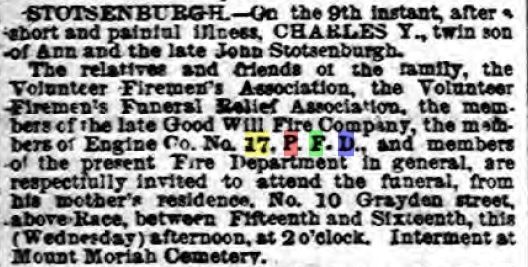Lots to be said for what a photo says especially in terms of history or historical speculation.
This photo of a book in 1896 on old fire engines gives minimum detail except to say that I. P. Morris only built three engines and the one above is the deluxe model and was eventually scrapped in 1888 after the engine got into an accident on the job and I presume could not be repaired. Custom made items are hard to replace or repair on any level.
I was curious about the photo itself. Who or what was the Good Will engine. No doubt there is documentation in libraries etc. but in terms of what is available on the Internet where I do my limited research, a lot of sketchy details. Many collateral bits of newspaper items piece together an explanation.
Looking around for Goodwill or Good Will Engine on the Internet brought me these items among others.
During the Sanitary Fair of 1864, Goodwill enjoy won for "Prize Fire Horn" which is a new horn as prize or an award for the company horn?
 |
| Inquirer 17 June 1864 |
 |
| Inquirer 30 June 1870 |
According Wikipedia, the Philadelphia Fire Department came into official city recognition in 1871.
https://en.wikipedia.org/wiki/Philadelphia_Fire_Department
Meaning that after 1871, the city pays Firemen directly and directly manages the Engine Houses. Before that, the volunteer fire engine companies existed with some subsidies from the city.
Ran into a newspaper article about how GoodWill engine house was out on parade in mid 1860s with other engine companies in the city. The article stated that the volunteers in parade numbered over 200. A lot of volunteers.
The nature of this social fabric switch is noted in a burial notice of the time, 1877, mentioning "Volunteer Firemen's Association, Volunteer Firemen's Burial Relief Association, the "late" Good Will Fire Company and Engine Co. No. 17 P. F. D..
 |
| Inquirer 12 Sept 1877 |
In its time, the volunteer fire brigades, seeing the members sizes, were no doubt important local social institutions providing occasional employment, and burial insurance of in most cases probably passing the hat to cover the average cost of funerals back then, coffin and plot, of less than twenty dollars.
With a photo above with "17" on the engine, that would seem to date this photo of firemen as city employees somewhere along a timeline of 1871-1888. Which means labeling the photo in 1896 as Good Will Engine may be that the name for the company stuck after it merged into the city fire department.
Also with "100 men strong" in volunteers as when the Good Will Company marched in Grant's 1869 Inaugural Parade in Washington DC, no doubt a number of pubs and saloons in the neighborhood would have been gathering spots for drinking, weddings, wakes, political electioneering etc.
Social fabric of center city no doubt changing around early 1870s with the construction of the new Public Buildings aka City Hall.
Philly History history archives have images of the old Fire Department HQ at 1328 Race St. Do not know when it was built, in stages etc. Does not match image above.
https://www.phillyhistory.org/PhotoArchive/Detail.aspx?assetId=97768
https://www.phillyhistory.org/PhotoArchive/Detail.aspx?assetId=67898
Building would appear to have been there in 1916 with Sanborn map.
Which leads us to old equipment stored in that old HQ - no date.
N. Juniper and Race Sts. - no date
https://www.phillyhistory.org/PhotoArchive/Detail.aspx?assetId=52111
https://www.phillyhistory.org/PhotoArchive/Detail.aspx?assetId=52111
And I. P. Morris, Isaac Paschall Morris, 1803-1869, Druggist, Machinist, Iron Foundry owner.
One of the twenty wealthiest Philadelphians at his death. No living descendants that I can deduct. Buried in Laurel Hill Cemetery.
The only male inheritor of Cedar Grove Mansion in Harrowgate, donated by his daughter Lydia Thompson Morris to the city, relocated in Fairmount Park.
His business concern I. P. Morris & Co. that built the fire engine above specializing in marine boilers and marine engines, aka The Port Richmond Iron Foundry, bought out by Cramp and Sons in 1891.
 |
| McElroy's City Directory 1860 |
 |
| Inquirer 15 Feb 1862 |
 |
| Inquirer - 1868 |
 |
| Inquirer 22 Sept 1881 |
 |
| 1875 G M Hopkins Phila. Map |
 |
| Inquirer 6 July 1948 . |
.







No comments:
Post a Comment